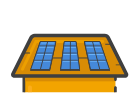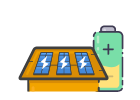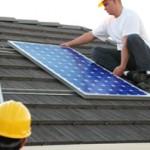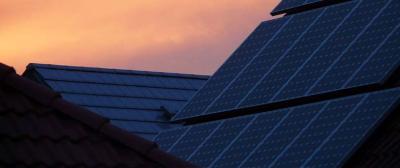Can I Use Solar Power At Night?
 Yes and no, solar panels do not work at night. However, what you can do is store the energy you generate during the day on a battery pack so that you still have power even when there’s little to no sunlight.
Yes and no, solar panels do not work at night. However, what you can do is store the energy you generate during the day on a battery pack so that you still have power even when there’s little to no sunlight.
Whilst solar panels are not effective at generating energy at night, new technology means it's easier than ever to store and use solar energy at night that was produced during the day. Batteries are the most common storage method and they are becoming more affordable and efficient each year. With releases like Tesla’s Powerwall battery just around the corner, it's only a matter of time before more homes could be powered purely from solar energy - even at night!
Find out more about the many uses of solar energy in the home.
How much light do solar panels need to work?
Solar panels are made up of photovoltaic cells which convert sunlight into electricity. In order for this to work the panels need at least a low level of sunlight, meaning they can't produce much (if any) energy at night. Although the moon may provide some light at night time, especially on cloudless evenings and when it is fuller, this kind of light cannot be used effectively by solar cells. Since you can't rely on energy from your solar array at night you have two main options; store and use excess energy generated in the daytime or get your power from the utility grid.
If you are interested in solar panels for your home you can get free quotes from MCS certified (or equivalent) installers using our simple online form.
Storing solar energy in batteries
Recent technological breakthroughs mean storing excess solar power in batteries is becoming a reality for many households. Home storage batteries are currently available to consumers in the UK and the majority can be fitted to existing solar panel arrays. There are however some drawbacks to many of the battery systems currently on the market - including their size and the fact that most of them can't store a great deal of power. Cost is also a deciding factor for a lot of homeowners, with the majority of batteries sitting at a high price point. Tesla has recently announced its new Powerwall battery which aims to combat all three of these issues – a huge step forward for domestic solar storage that will hopefully see batteries adopted by more households.
Does storing solar energy affect Feed-in Tariff payments?
Using a battery to store the solar energy you don't use in the day could affect your Feed-in Tariff payments if you are already receiving them (the FiT scheme is closed to new applications). While you would still receive the same generation tariff, you would likely see a reduction in your export tariff. This is because you would be generating the same amount of power but selling less of it to the utility company if you are using it yourself. Not to worry though, you would likely benefit more from using your own stored energy as the cost of energy from the grid is higher than the amount you would earn from the export tariff.
Are there any new solar panels that work at night?
Whilst there have been some researchers in Mexico who say they are close to producing solar panels that work at night, nothing is commercially available yet and likely wont be for many years. So for right now, you can achieve the same thing by using a solar battery to store the surplus energy you gather during the day.
Using energy from the utility grid
If storing the energy generated by your solar panels isn't for you, using energy from the utility grid could be the answer. When your solar panels go into standby at night you can automatically switch to using electricity from your supplier. This is the most common way solar users get their electricity when power from their panels are not generating the required amount (or at night). Whilst this is a great way to utilise the extra energy you would not use otherwise, it is not as cost effective as storing power you have generated yourself.
If you are interested in solar panels for your home you can get free quotes from MCS certified (or equivalent) installers using our simple online form.
Find local, MSC certified Solar Installers
Start your quote
Find local, MSC certified Solar Installers















